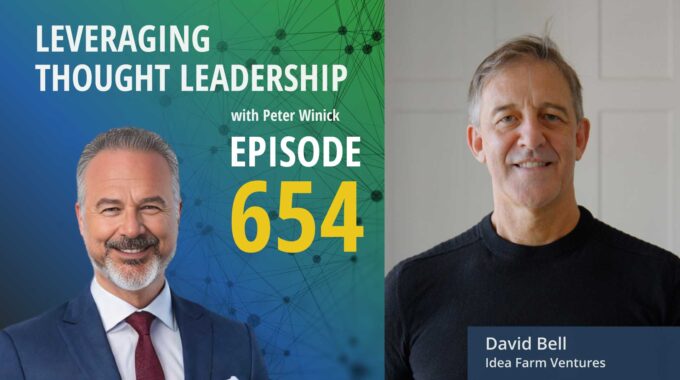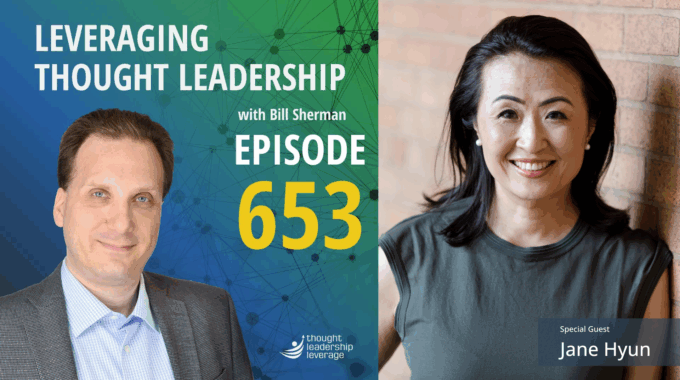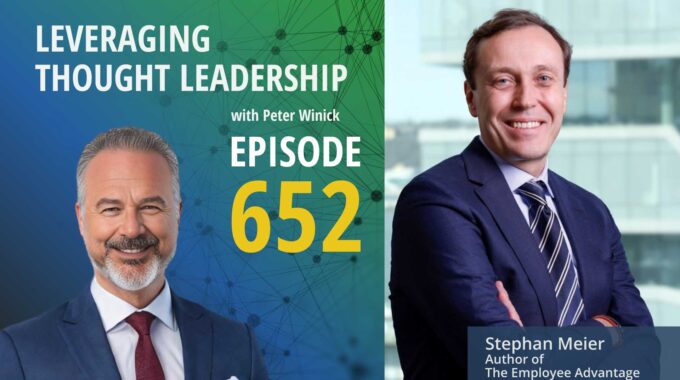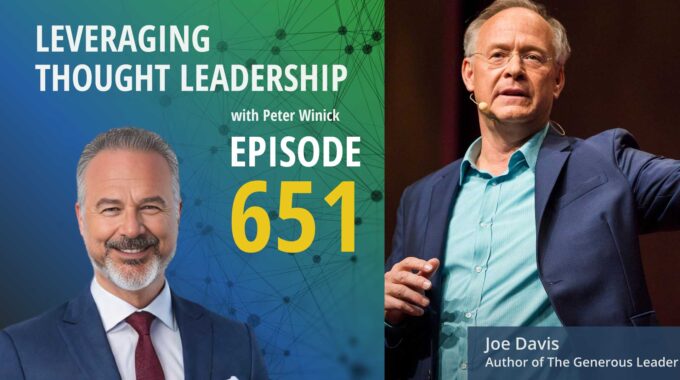Turning frameworks into funding: The hard truth about scaling thought leadership. This episode explores how…
Selling From Your Comfort Zone | Stacey Hall
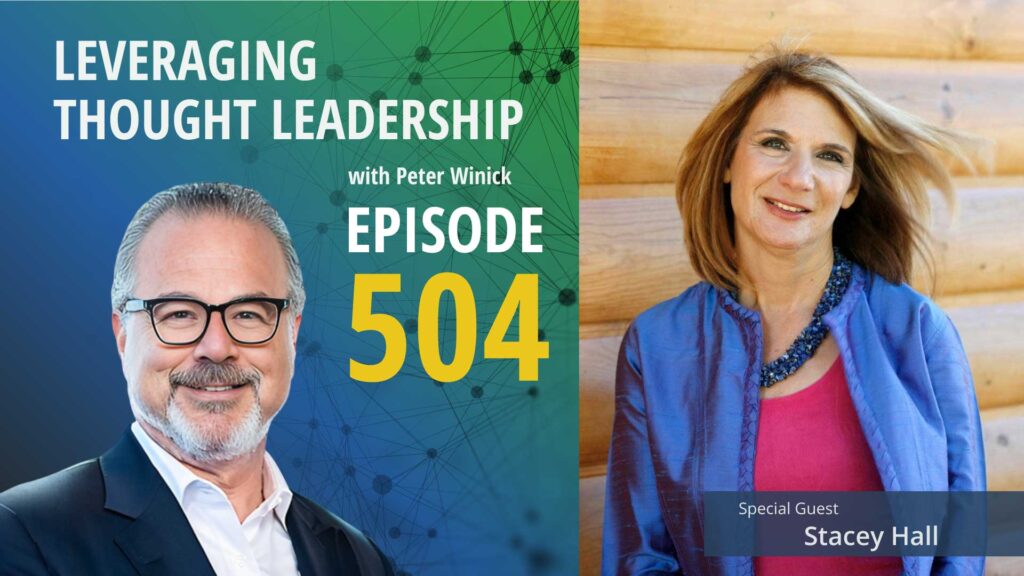
Monetizing the wisdom in your thought leadership book
An interview with Stacey Hall about her new book, creating alignment with your core values, and marketing derivatives of the book.
Ever heard, “To be successful, you have to get out of your comfort zone!”
But if your “comfort zone” aligns with your core values, what then?
Can you find an alignment between those values and marketing that will allow you to stay in your comfort zone and find success?
Our guest today is the “Go for Yes Gal!” Stacey Hall! Stacey is the founder of Success with Stacey Hall, a well-known success strategist, TedX speaker, and best-selling author with her fifth book “Selling from Your Comfort Zone: The Power of Alignment Marketing”.
Our conversation starts by covering the 23 years between Stacey’s first and fifth books. She shares what has changed and what has stayed the same in the publishing industry and why she returned to BK Publishing for her newest book.
Stacey discusses the content of her book Selling from Your Comfort Zone explaining how people want to stay aligned with their core values and are no longer willing to let them go. She covers how the current environment for sales can be confusing and why it is often better to stay in your comfort zone, expanding on it in alignment with your current values and skills.
In addition to learning about the content of the book Stacey shares how she is marketing the book and what she is doing differently now. She gives us insights into using technology like social media, AI, and podcasts to market the book from home to create both free and paid offshoots of the book that you can use to lead people to the book or your other offerings.
Three Key Takeaways:
- Put tidbits of your book on social media. Don’t just tell them the book is coming give them bits of the content as a teaser.
- When creating free tie-ins to the book, they have to come out before the book to create interest and excitement.
- It is important to publish your book in different formats. Paper, ebooks, and audio have all become popular methods of consuming books.
If you need a strategy to bring your thought leadership to market, Thought Leadership Leverage can assist you! Contact us for more information. In addition, we can help you implement marketing, research, and sales. Let us help you so you can devote yourself to what you do best.

Transcript
Peter Winick And welcome, welcome, welcome. This is Peter Winick. I’m the founder and CEO at Thought Leadership Leverage and you are joining us on the podcast today, which is Leveraging Thought Leadership today. My guest is Stacey Hall. She’s the Go for Yes gal. She’s got a new book out, I think it’s number six or seven called Selling from Your Comfort Zone. She is a success strategist, a TEDx speaker, and a Multi-time author. So welcome aboard, Stacey. How are you?
Stacey Hall Peter, I’m wonderful. It’s great to be with you here today. Thank you.
Peter Winick So I want to go down a little bit of a different path to start, if we could. So this is a book number six or seven?
Stacey Hall No, it’s actually number five that I’ve written completely. I have contributed to many more than that. But this is my fifth book.
Peter Winick So five solos and. Okay, got it. So give me a sense then of the difference between the first books you were involved then and your latest in terms of what it takes to get them out in the world, market them what your goals are. Give me sort of like the book journey, if you will.
Stacey Hall It’s funny that you would say that because my first book and this fifth book are for the same publisher for the same reason. Okay. What happened in between was the rest of the journey. And so I’ve come 360 degrees around. So my background, my training was always in marketing and sales. So my first book came out because I had a commitment to teach people that it wasn’t necessary to do business like war. It was a very popular at the time. It’s still well known marketing strategy that was all based on warfare, and it upset me greatly because it was helping people treat other people in ways that were inappropriate. I’ll just say it just kept perpetrating the whole concept that you couldn’t do business with friends and just kind of.
Peter Winick The antithesis of win and the alpha male and the targeting and the, you know, kill your competitor that started this sort of mentality.
Stacey Hall It was all about, yeah, yes, business is war. To do business with friends, be armed with a script. Don’t take no for an answer. Right? Yeah. All of the things that led to the definition of a salesperson of being pushy and spammy, which is continue to today. Studies still show when you think of a salesperson, what’s the word that comes up that’s going to be pushy or spammy? Sure. So that’s not the way I had never done business. And I saw it happen. I’ve been taught more and more. I said there, if we got back to using the Law of Attraction, where we treat people the way we want to be treated and we’re clear who people that we’re meant to serve are, there’s no reason to do war. And I presented that idea to a publisher. Well, I have the agent who presented that idea to a publisher, their color publishers, which was brand new back then. This is like 23 years ago.
Peter Winick Right?
Stacey Hall I love the idea because it was based on synchronicity, so strategic synchronicity.
Peter Winick So even though and we’ll get back to this, you sort of started with B.K. and now I’ve come back to them and there’s been a lot of stuff in between. I would argue that as wonderful as B.K. is, they just like every other publisher, have evolved, changed, etc. today as compared to what they were 23 years ago in lots of ways. Good, bad and ugly. Right? So what?
Stacey Hall How are you? Ready? Okay, well, first off, I’m going to say there’s been no ugly, not just because they’re my publisher and I love them, but truly.
Peter Winick They were we being the industry? Not them. No. Ugly being.
Stacey Hall Me. Yeah, well, what’s amazing is they were a small boutique agency, the publisher at the time, and I wasn’t sure I wanted to go with them because, you know, I wanted the big guys and they were in the big guys were interested in this. Something just felt right about them. Their commitment to be the place to bring thought leadership. Like that’s all that’s they’re interested in is a world that works for all. And people who write books that make it possible to have a world that works for all. They just continue to expand and expand and expand. They were one of the first that got involved in multimedia, not just books. So yeah, they’ve continued to evolve and expand and very stay very much in alignment with their purpose. Very much.
Peter Winick And I guess let me try a little bit of a different way. What is it that you’re doing today? That’s the same when you first published 23 years ago and what are you?
Stacey Hall Okay.
Peter Winick Totally different.
Stacey Hall Okay. So that’s a so the fifth book. So in between there were other types of books with other publishers coming back to back. What I saw was the 20 year anniversary of my first book, which still sells very well, and presenting to them that concept of why don’t we just update it for today. They said, No, the world has changed. You can’t just update it what is exact? They asked me exactly what you just asked me. What is new and different? What do we know today as a society in sales that we didn’t know 20 years ago? And that’s where I said, well, I think people are more open now to the concept of being in alignment with ourselves. I think attraction, the law of attraction got bastardized. Excuse me, Nobody understands that anymore. But when we talk about alignment, what we talk about our core values, more and more people are saying, I’m holding on to those and I’m not letting go. And what do you think about that? Now, why is everybody now saying you have to get out of your comfort zone? So the buzz word in society is to be successful, you have to get out of your comfort zone.
Peter Winick God, how can.
Stacey Hall You get out of your comfort zone if you’re in alignment with your values? So what’s happy is people are getting splintered. They do not know what direction to go into, and it’s especially apparent in the sales industry. So I took that that approach of let’s stay in our comfort zone. Let’s expand it based upon our values for good at doing our talents and our skills. And then that’s what their killer wanted to explore. Nobody’s talking about that in business these days.
Peter Winick But I guess So. What is it that you have to do as the author to help get that message out there? Because they provide a platform, they provide the infrastructure, they provide community. But it’s not like I’m just want to make sure folks understand. It’s not like all you have to do is write an amazing book and then rainbows and unicorns. No, not at all.
Stacey Hall It’s funny that you ask that because of two weeks ago, I was just put on with the Committee for Better Color, our annual book marketing workshop three days explaining what an author has to do. So in answer to your question, I’m not doing anything different than I did 20 years ago. It was still on me to market the book, The Beauty. So there’s no ugly because the beauty is with social media now, with AI, with all the tools, all the bells and whistles an author has available to them. It’s so much easier. I don’t have to get my butt on the plane and go to book signings in every possible location. I don’t have to spend thousands of dollars doing that and time away from my family like I did 20 years ago. Now I can connect with you right on podcasts. I can hold webinars, I can create courses, I can create little eBooks off of it. I can have my own podcast. I can do all these things that allow me to get my message out. And oh, by the way, I happen to have a book too, if you want more.
Peter Winick Got it. So let’s split those things in two. Right? So one of the great benefits of putting a book together, writing a book is it forces you to get clear in terms of your thinking and how you articulate it and you play with your models, you play with your methods, and then it’s like just right, you know, it’s like a baking or experimenting with recipes. Pie Just right now, it’s just weight. It’s in the book as good as could be. Right? Then there are derivatives of the intellectual property of the thought leadership that live in the book that you can put out in the universe A for free as marketing, as just to share it with the universe, to get impact, whatever. That’s great. And then there are other derivatives of the same ideas, methodologies and frameworks that you get paid for. To give me a sense of sort of where that split you are.
Stacey Hall Okay. Well, first off, this is one of the things I taught at the workshop. When writing the book. We have to now think about the marketing potential for the book. Maybe that wasn’t as important 20 years ago because you went to bookstores and you talked about the book. Now, well, we’re putting the book together. We have to think about what organizations would want to get behind this book, how to work.
Peter Winick Together. So it used to be, if I’m understanding you correctly, after the book’s written, then we think about marketing and you’re saying during the process you want to be really clear about whom I writing this for, who can support me, etc., etc. and that might actually impact from an editorial perspective, the way you tell the stories, what you put in there, what you exclude from there, etc..
Stacey Hall It absolutely is supposed to. Let’s put it that way. Okay. And even before we get the idea to write a book, what have we been doing as you talks so clearly about how are we getting the message out already before the book comes? Are we preparing the audience for the book to come in to the marketplace? Because without that, good luck trying to get attention. And once the book is out, it’s really too late. So we have fans that we already have people who are talking about the book coming, what we do a launch for the book. We have people who will attend and actually buy the book that day, which will take it to number one on Amazon. If we have an audience already that people are talking about, other people will start paying attention and putting as many people as much acknowledgment into the book as possible. Because none of us, none of us ever write a book by ourselves, really. The knowledge comes from many different places. The more people we can acknowledge, the better in the book.
Peter Winick If you’re enjoying this episode of Thought Leadership Leverage, please make sure to subscribe. If you’d like to help spread the word about our podcast, please leave a five-star review at ratethispodcast.com/ltl and share it with your friends. We’re available on Apple Podcasts and on all major listening apps as well as that thoughtleadershipleverage.com/podcast.
Peter Winick So go back a half a step for me if you would to what are the things that are in the book that you are putting in other formats under call let’s call it a marketing umbrella or a monetization realm.
Stacey Hall Okay. So pulling, So I’m just going to say what I was right in selling from your comfort zone. Yeah, I would make a statement that I believed. Then I would Google. To find if other people had had the same thoughts, meaning they published articles. Did they write books on these? I would pull some of their information into my book, let them know that I was quoting them at my book.
Peter Winick Tour and.
Stacey Hall Asking if they wanted to be available for a webinar. Was we likely to jointly host a webinar together? Right? Or would they want to participate at my launch party and see if you were.
Peter Winick There for a half a second? Because I think that newer authors don’t realize how welcoming sort of the thought leader and author community they I think been. And maybe this goes back to your comment earlier businesses were you know I think a lot of people early on think that oh, they’re my competitor and it’s like actually it’s the opposite. If someone likes content around, you know, selling from your comfort zone or things tangentially related to that, they’re going to like yours as well. It’s not a zero-sum game. And I think that’s really, really important for people to understand. And more importantly, the other authors and thought leaders in the community would say, Oh, come on, welcome aboard. What can I do to help you? Yeah.
Stacey Hall So I got this cart. Okay. Yes, it’s me. Okay. I’ve just got this card. It came from the author, Larry Levine of Selling Your Heart. Yeah. Yeah. What? Because he just had me to speak to his audience, and then he sends me a thank you card for doing so. Like, are you kidding me? This is incredible. Of course, I’m giving them a shout out right now because this is what they do. Plus, I’m sharing the podcast that we did together. Yes, you’re absolutely right. We need to be not expecting that we were the first and only person to have a similar thought. So I reached out to all these people and said, I’m putting you in the book. I also reached out to folks who had been following my messages, said, You’ve been following me. Have you been doing anything that I’ve offered as tips? Yes. Would you like to expand on that interview with me and I’ll put the interview in the book.
Peter Winick Love it. Right.
Stacey Hall Okay. Now, he said to me, What am I doing? The market, That it’s inside the book. I’m taking all those quotes. And they’re part of my social media campaign. Right.
Peter Winick So now. Right. You’re going to give me a quote or you’re going to put a quote up there. I love that. So then what are the what are the other ways you’re monetizing? Because, I mean, at the end of the day, it’s very, very, very rare for an author to make money. Net net number of units sold, dollars per book, whatever. Under the business side of it, what are the business lines or the offerings or the solutions that are kind of being brought into the world as a result of the book?
Stacey Hall Well, I’m getting exposure to organizations that want a higher sales trade and want a new concept, so I get paid that way. I also create my own webinars, my own mini courses, my own courses. I sell those based on the concept of selling from your comfort zone. I get involved in summits with other people, other thought leaders who are organizing them. I get to talk about it there. I get to sell things from that platform. A thought leader can go anywhere they want. The world these days with anything they’re saying. If we’ve got something to say, we can monetize it Well.
Peter Winick And I think what’s interesting, one of the things that’s interesting about your work is obviously because in you’re in you’re in the sales and marketing space, people say, well, of course for Stacy, this is natural. She’s a sale. You know, she’s a marketer and a great salesperson. But everything that you said, I would argue, would apply to someone writing a book on resilience, leadership management, authenticity, work from. And I think that’s the problem is thought leaders that are in a non sales space, 90 something percent of them say, oh, but I’m not a salesperson or a marketer. And it’s like, okay, well then you know, you the word broken author doesn’t need to be next to each other.
Stacey Hall That’s the choice you make. Exactly. And these are my clients. Actually, I all of my clients who come to me for sales, marketing and help, I speak to them about their thought leadership. It’s like, yes, I know you’re selling this, but the wisdom you have that you’ve gained from selling this can also be monetized. And let’s start putting together first, maybe an e-book, but then develop it into an actual book. And let’s get you on podcast. So let’s get you on summits. And oh, by the way, you’ll still be selling this, but you’re also selling this. And that’s in this day and age. Does it matter if you’re the parent of a child on the spectrum and you’ve got tips for other parents of children on the spectrum, you’re going to be able to sell that wisdom.
Peter Winick What I think that’s really the piece where, in my opinion, my experience, the books that don’t sell well, it’s not because necessarily no, there are some exceptions to this. They’re not good books. I mean, I’ve read so many books that are just amazing, brilliant books that very few people have heard of. It’s largely because there’s there isn’t a high quality sales and marketing strategy or execution of that strategy underneath it because, you know, just, hey, it’s pub de la la la. Like, that’s not going to do it today.
Stacey Hall Not anymore. As some for years, but especially not with social media, not when there’s so much free. So the free has to come out first.
Peter Winick Yes.
Stacey Hall And then the book comes and the book has to be in numerous forms. That’s the other thing that I want to say. When my book came out, if you had an e-book, it it was considered trash.
Peter Winick Right. Right.
Stacey Hall 20, 23 years later, self-published books of any size are better than just a blog, better than just a post people. And now if it’s on Kindle, that’s really how people want to consume more often, is they want the e-book version, right?
Peter Winick I think there’s a lot of reasons for that. Some misperceptions, misconceptions around the publishing industry. Others are early on, you know, 20 something years ago, a lot of self-publishing was a crappy product. It was just flop. You know, today there’s zero excuse for bad editorial, bad or quality, whatever. And if you can tell the difference between your, quote, self-published book and a professionally self-published book, then you did something wrong.
Stacey Hall Right, Exactly. Exactly right. I’m saying that’s changed a lot now. A lot preferred the e-book. Audible has also, you know, now people want to consume an audio that was necessary 23 years ago. Fact that I mean, there were audio books back then. There was an organization that’s still around called Sounds True. And Joe Talley was one of the first people who used to put his books in audio.
Peter Winick Ship, an odd niche. Now, you would never, you know, years ago it’d be paperback, you know, hardcover and then the paperback. But now all sort of comes at once. You know, you’ve got your regular book, you’ve got your digital, you’ve got your audio because people have different preferences. And it’s silly to say, Well, I’m only going to put it out in one format. It’s like whatever their preferences are, make it available, make it accessible. People are, you know, whether it’s at the gym or taking walks or during commute, whatever their consumption preference. It’s not just sitting there with a cup of tea, reading a physical book in your hand. Those days are over. This is awesome. And any last tips to someone that is maybe a year behind where you are now? You know, they’re still wrapping up the editorial process and haven’t launched it yet.
Stacey Hall But yes, I would say start pulling out tidbits from your book and put them on social media in whatever format you can, Whoever your audience is, start letting people know the book is coming. Not by saying my book is coming, but by putting out bits of the contact and saying more of this is coming.
Peter Winick I love it. Well, this has been great. I appreciate your time. Lots of lots of wisdom here. And best of luck with this book and everything else you’re doing.
Stacey Hall I appreciate that very, very much. And blessings to you.
Peter Winick To learn more about Thought Leadership Leverage, please visit our web site at ThoughtLeadershipLeverage.com to reach me directly. Feel free to email me at Peter at ThoughtLeadershipLeverage.com and please subscribe to Leveraging Thought Leadership on iTunes or your favorite podcast app to get your weekly episode automatically.


